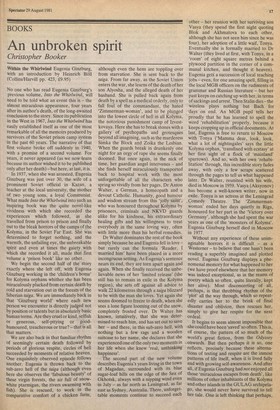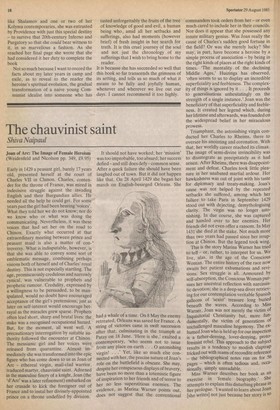BOOKS
An unbroken spirit
Christopher Booker
Within the Whirlwind Eugenia Ginzburg, with an introduction by Heinrich Boll (Collins/Harvill pp. 423, £9.95) No one who has read Eugenia Ginzburg's previous volume, Into the Whirlwind, will need to be told what an event this is — the almost miraculous appearance, four years after its author's death, of the long-awaited conclusion to the story. Since its publication in the West in 1967, Into the Whirlwind has easily established itself as one of the most remarkable of all the memoirs produced by survivors of the Soviet prison camp system in the past 60 years. The narrative of that first volume broke off suddenly in 1940, with a promise of a second volume. For years, it never appeared (as we now learn because its author wished it to be published only after her death) — but here, at last, it is.
In 1937, when she was arrested, Eugenia Ginzburg was just over 30, the wife of a prominent Soviet official in Kazan, a teacher at the local university, the mother of two young sons, a loyal Communist. What made Into the Whirlwind into such an inspiring book was the quite novel-like vividness with which she recorded the experiences which followed, as she travelled from prison to prison and finally out to the bleak horrors of the camps of the Kolyma, in the Soviet Far East. She was determined to forget nothing, and the warmth, the unfailing eye, the unbreakable spirit and even at times the gaiety with which she recorded it all, made that first volume a 'prison book' like no other.
We begin the second half of the story exactly where she left off, with Eugenia Ginzburg working in the 'children's home' for Kolyma orphans whither she has been miraculously plucked from certain death by cold and starvation out in the forests of the Siberian taiga. We are immediately back in that `Ginzburg world' where each new person we encounter is directly judged not by position or talents but in absolutely basic human terms. Are they cruel or kind, selfish or generous, self-pitying or goodhumoured, treacherous or true? — that is all that matters.
We are also back in that familiar rhythm of seemingly certain death followed by periods of glorious respite, circles of hell succeeded by moments of relative heaven. One exquisitely observed episode follows another. Eugenia is thrown back to the sub-zero hell of the taiga (although even here she observes the 'fabulous beauty' of these virgin forests, the air full of snowwhite ptarmigan, the rivers swarming with fish). She is rescued, to work in the comparative comfort of a chicken farm, although even the hens are toppling over from starvation. She is sent back to the taiga. From far away, as the Soviet Union enters the war, she learns of the death of her son Alyosha, and the alleged death of her husband. She is pulled back again from death by a spell as a medical orderly, only to fall foul of the commandant, the hated 'Zimmerman-woman', and to be plunged into the lowest circle of hell in all Kolyma, the notorious punishment camp of Izvestkovaya. Here she has to break stones with a gallery of psychopaths and grotesques beyond all imagining, such as the murderess Simka the Block and Zoika the Lesbian. When the guards break in drunkenly one night for an orgy of rape she seems finally doomed. But once again, in the nick of time, her guardian angel intervenes — and she finds herself miraculously transported back to hospital work with the most unforgettable of all the characters who spring so vividly from her pages, Dr Anton Walter, a German, a homeopath and a devout Catholic. Humanity, good humour and wisdom stream from this 'jolly saint', who was honoured throughout Kolyma by prisoners, criminals and NKVD guards alike for his kindness, his extraordinary healing gifts and his willingness to treat everybody in the same loving way, often with little more than his herbal remedies.
Dr Walter dominates the rest of the book simply because he and Eugenia fell in love — but rarely can the formula 'Reader, I married him' have been placed in a more incongruous setting. As Eugenia's sentence nears its end, they are torn apart again and again. When she finally received the unbelievable news of her 'limited release' (she still has to remain in exile in the Kolyma region), she sets off against all advice to walk 22 kilometres through a taiga blizzard to be with the man she loves. Yet again she seems doomed to freeze to death, when she sees a lone figure looming out of the snow, completely frosted over. Dr Walter has known, intuitively, that she was determined to reach him, and has set out to save her — and there, in this sub-zero hell, with nothing but a few rags and a wooden suitcase to her name, she declares that she experienced one of the only two moments in her life when she knew 'real, unthinking happiness'. The second part of the new volume describes Eugenia's years living in the town of Magadan, surrounded with its blue sugar-loaf hills on the edge of the Sea of Okhotsk, always with a nipping wind even in July — as far north as Leningrad, as far east as Sydney, Australia. There, unforgettable moments continue to succeed each other — her reunion with her surviving son Vasya (they spend the first night quoting Blok and Akhmatova to each other, although she has not seen him since he was four), her adoption of a little waif, Tonya. Eventually she is formally married to Dr Walter (they lived at first, with Tonya, in a 'room' of eight square metres behind a plywood partition in the corner of a communal kitchen, and thought it heaven). Eugenia get a succession of local teaching jobs — even, for one amazing spell, filling in the local MGB officers on the rudiments of grammar and Russian literature — but her past keeps on catching up with her, in terms of sackings and arrest. Then Stalin dies — the wireless plays nothing but Bach for days on end. An MGB pupil tells her proudly that he has learned to spell the word 'rehabilitation' properly, because it keeps cropping up in official documents. At last, Eugenia is free to return to Moscow with Tonya ('Mamma dear, look, look, what a lot of nightingales' says the little Kolyma orphan, 'transfixed with ecstasy' at her first sight of a flock of 'mainland' sparrows). And so, with her own 'rehabilitation' through, this incredible story fades away, with only a few scraps scattered through the pages to tell us what happened later. Dr Walter, reunited with his wife, died in Moscow in 1959. Vasya (Aksyonov) has become a well-known writer, now in exile. Tonya is an actress at the Leningrad Comedy Theatre. The 'Zimmermanwoman' ended her days quietly in Riga, honoured for her part in the 'Victory over Germany', although she had spent the war years as one of the 'monsters of Kolyma'. Eugenia Ginzburg herself died in Moscow in 1977.
Without any experience of these unimaginable horrors it is difficult — as a Westerner — to believe that one hasn't been reading a superbly imagined and plotted novel. Eugenia Ginzburg displays a phenomenal memory for what happened to her (we have proof elsewhere that her memory was indeed exceptional, as in the reams of poetry which so often, quite literally, kept her alive). Most disconcerting of all, perhaps, is that throbbing rhythm of the 'plot' all the way through, which so repeatedly carries her to the brink of final disaster and oblivion, then rescues her, simply to give her respite for the next ordeal.
It begins to seem almost impossible that she could have been 'saved' so often. This is, of course, the pattern of so much of the world's great fiction, from the Odyssey onwards. But then perhaps it is so, one reflects, precisely because these alternations of testing and respite are the inmost patterns of life itself, when it is lived fully and with growing self-awareness. And after all, if Eugenia Ginzburg had not enjoyed all those 'miraculous escapes from death', like millions of other inhabitants of the Kolyma and other islands in the GULAG archipelago, she would never have survived to tell her tale. One is left thinking that perhaps, like Shalamov and one or two of her Kolyma contemporaries, she was entrusted by Providence with just this special destiny — to survive that 20th-century Inferno and Purgatory so that she could bear witness to it, in so marvellous a fashion. As she reached her final page she wrote that she had considered it her duty to complete the book Not so much because I want to record the facts about my later years in camp and exile, as to reveal to the reader the heroine's spiritual evolution, the gradual transformation of a naive young Communist idealist into someone who has tasted unforgettably the fruits of the tree of knowledge of good and evil, a human being who, amid all her setbacks and sufferings, also had moments (however brief) of fresh insight in her search for truth. It is this cruel journey of the soul and not just the chronology of my sufferings that I wish to bring home to the reader.
It is because she has succeeded so well that this book so far transcends the grimness of its setting, and tells us so much of what it means to be fully and joyfully human, whenever and wherever we live out our days. I cannot recommend it too highly.



































 Previous page
Previous page